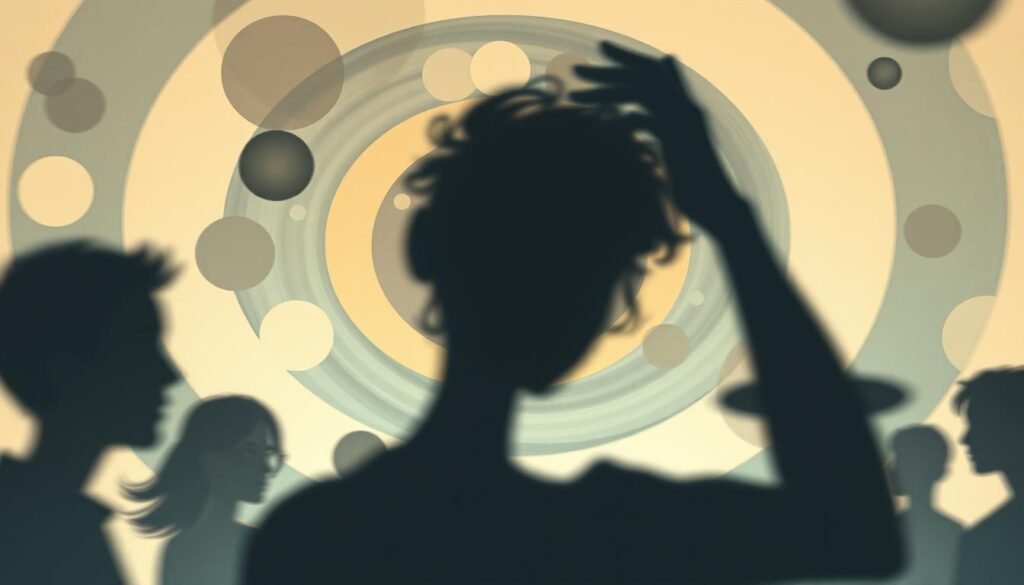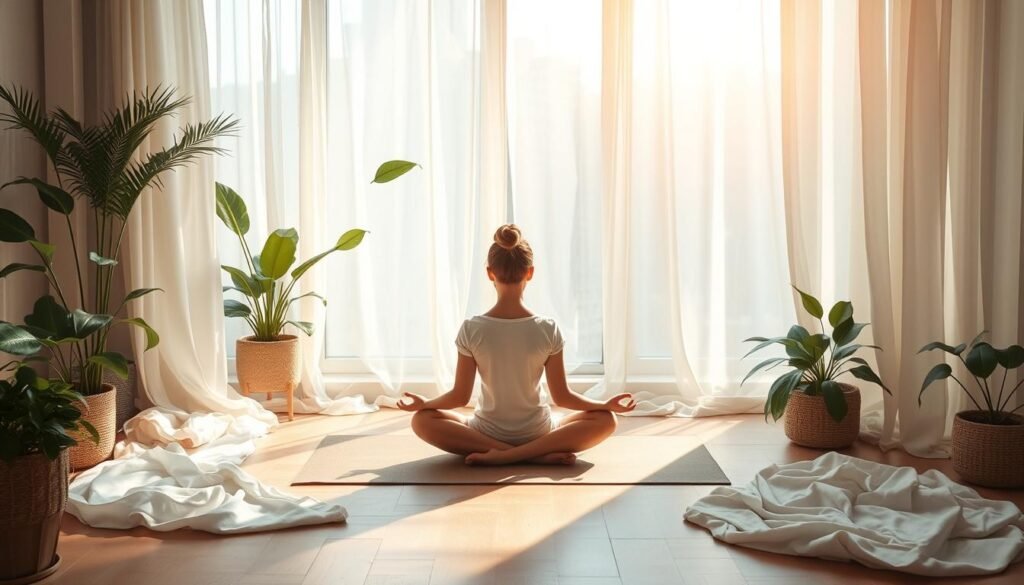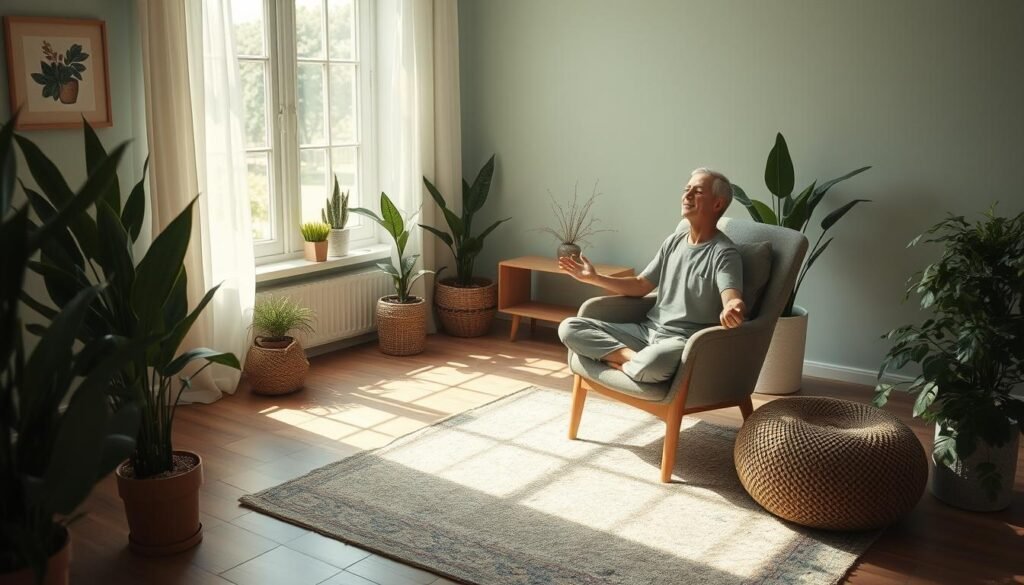Did you know that nearly 50% of those with anxiety also feel dizzy? This fact shows how closely anxiety and dizziness are linked. As anxiety becomes more common, it’s vital to understand how it causes feelings of lightheadedness. The good news is, managing dizziness from anxiety is possible with various remedies. Recognizing what causes and triggers this type of dizziness helps people find effective treatments.
Key Takeaways
- Many individuals with anxiety disorders also suffer from symptoms of dizziness.
- Dizziness often improves without specific treatment within a few weeks.
- Medications, therapies, and lifestyle changes can help alleviate anxiety-related dizziness.
- It is important to accurately describe symptoms to healthcare professionals for better diagnosis.
- Simple lifestyle adjustments and controlled breathing techniques can significantly reduce episodes of dizziness.
Understanding the Connection Between Anxiety and Dizziness
The link between anxiety and dizziness is complex but very important to understand. Around 18 percent of people in the United States, which is more than 40 million adults, suffer from anxiety disorders each year. This shows how common anxiety symptoms like dizziness are. People with anxiety might feel light-headed, like they’re moving, spinning, out of balance, or unsteady. These feelings drive many to explore the relationship between anxiety and dizziness.
Research shows people with anxiety disorders are much more likely to get benign paroxysmal positional vertigo (BPPV). Women and those already dealing with cerebrovascular diseases are at higher risk. Anxiety-related symptoms can make overall health worse, affecting the life quality of those with more frequent dizziness. Psychotherapy, like cognitive behavioral therapy (CBT), and medications such as antidepressants can help manage anxiety over time.
Making lifestyle changes is also helpful for those dealing with anxiety and vestibular disorders. Relaxation, meditation, yoga, and physical exercise are key in stress management. Learning about the vestibular system’s role in keeping us balanced shows how vertigo and anxiety are connected. Doing physical activities to strengthen vestibular function can lessen symptoms.
It’s key to seek wide-ranging support that looks at both physical and mental health. It’s vital to tackle dizziness that might stem from anxiety or similar issues. The interaction between these aspects highlights the need for careful assessment and treatment. For more details on this relationship, visit anxiety and dizziness.
Dealing with Dizziness Caused by Anxiety
Anxiety can lead to dizziness in different ways, such as sudden lightheadedness or ongoing unsteadiness. It’s vital to understand the Causes of Anxiety Dizziness. Knowing the common triggers and symptoms helps you deal with anxiety-related dizziness better.
Overview of Anxiety-Induced Dizziness
A study in Germany found that 15.8% of people felt dizzy, and many had anxiety symptoms. It shows the link between anxiety and physical feelings like dizziness. To manage it, it’s key to focus not just on the anxiety but also on how it affects your body.
Common Causes of Dizziness in Anxious Individuals
- Hyperventilation: This often happens during panic attacks. It makes oxygen levels drop and can make you feel lightheaded.
- Dehydration: Not drinking enough water can make anxiety-related dizziness worse.
- Adrenaline Rush: When you’re scared, an adrenaline rush can make you dizzy as your body gets ready to react.
- Vestibular Impairments: Physical therapy aimed at your vestibular system can help with anxiety-driven dizziness.
- Psycho-emotional Factors: Feeling emotionally unstable can make dizziness worse for people with anxiety.
If you’re really dizzy and also feeling nauseous, can’t breathe well, or have a terrible headache, you need to see a doctor right away. Usually, dizziness from anxiety isn’t dangerous and goes away on its own. Doing things like breathing slowly or focusing on something steady can make a big difference. By handling these main issues, you can lessen the dizziness anxiety causes.
The Role of Hyperventilation in Dizziness
Hyperventilation often happens when people feel anxious. This leads to rapid and shallow breaths. Such breathing changes can upset the body’s oxygen and carbon dioxide levels. As a result, many might feel dizzy and lightheaded. Knowing how anxiety and hyperventilation link up is key to managing dizziness well.
How Hyperventilation Occurs During Anxiety
About 1 in 4 people with anxiety may face hyperventilation. This can set off the body’s stress response, causing faster heart and breathing rates. People might feel lightheaded, short of breath, or even have muscle spasms. For those with ongoing anxiety, dizziness episodes are common and can last hours. Spotting these signs early is crucial for starting the right Anxiety-Induced Dizziness Management.
Effects of Breathing Techniques on Dizziness
Using good breathing techniques is vital in lessening hyperventilation impacts. Methods like diaphragmatic breathing can balance oxygen and carbon dioxide in the blood. This helps relieve dizziness. Breathing slowly through pursed lips or doing abdominal breathing can raise carbon dioxide levels. This is very helpful during hyperventilation episodes. Understanding the Effects of Breathing Techniques gives people tools to handle their symptoms better.
If dizziness keeps up, seeing a healthcare provider for more help or medicine is wise. For extra details on symptom management, click here.
Recognizing Symptoms of Dizziness Associated with Anxiety
Understanding different types of dizziness helps in managing them. Anxiety often shows up in ways that make daily life harder. Knowing the link between these sensations and anxiety disorders is key to getting the right help.
Acute vs. Chronic Dizziness
Acute and chronic dizziness have notable differences. Acute dizziness comes on fast and is usually due to panic attacks. It feels overwhelming and can cause a fast heartbeat and sweating.
Chronic dizziness stays with you longer, linked to ongoing anxiety. It makes you feel uneasy all the time, affecting your day. Knowing the difference helps in treating Anxiety Dizziness Symptoms quicker.
Identifying Signs of Panic-Induced Dizziness
Panic-induced dizziness feels like confusion or being faint. It happens in stressful places or tight spaces. This can make your anxiety worse, causing more dizziness and worry.
Common signs of panic-induced dizziness include:
- Sensation of lightheadedness
- Feeling of floating or being disconnected
- Increased heart rate
- Perspiration
- Difficulty concentrating
Noticing these Panic-Induced Dizziness signs is a step toward tackling anxiety. Dealing with what causes your anxiety can really help reduce dizziness and make life better.
| Type of Dizziness | Duration | Common Triggers | Associated Symptoms |
|---|---|---|---|
| Acute Dizziness | Sudden | Panic attacks, stressful situations | Rapid heartbeat, sweating |
| Chronic Dizziness | Persistent | Ongoing anxiety, stressors | Sensation of unsteadiness, fatigue |

Practical Tips for Managing Anxiety-Induced Dizziness
Dealing with anxiety-induced dizziness can be tough. Yet, learning Practical Tips for Anxiety Dizziness makes life better. Knowing how to handle it lets people take back control and cut down on dizzy spells. Having the right techniques for Controlling Dizziness from Anxiety boosts overall health.
Breathing Techniques to Alleviate Dizziness
Breathing exercises are key to lessening dizziness when anxious. Belly breathing and box breathing balance oxygen levels and help with hyperventilation. Adding minutes of breathwork to daily life brings quick relief.
- Belly Breathing: Inhale deeply through the nose, letting the belly expand. Then, exhale slowly through the mouth.
- Box Breathing: Inhale for four counts, hold for four, exhale for four, and pause for four.
- 5-4-3-2-1 Grounding Method: Spot five things you see, four you can touch, three you hear, two you smell, and one you can taste.
Strategies for Reducing Panic Attack Symptoms
Creating proactive plans helps manage Panic Attack Management effectively. Finding and understanding what triggers panic allows one to craft helpful routines to decrease anxiety and dizziness.
| Strategy | Description |
|---|---|
| Mindfulness Practices | Focusing on meditation or yoga increases awareness and lowers stress. |
| Regular Exercise | Staying active boosts both mind and body health, easing dizziness. |
| Healthy Nutrition | Eating well and staying hydrated nourishes and supports overall health. |
| Professional Support | Seeking therapy or guidance from a mental health pro offers key insights and aid. |
Mastering these methods builds strength and assurance in handling anxiety-driven dizziness. Blending these tactics paves the way to better mental and physical health.
Coping with Dizziness from Panic Attacks
Dizziness during panic attacks can trap you in a hard cycle. This cycle starts with panic, leading to dizziness, which makes the panic worse. It’s like being stuck on a scary ride that doesn’t stop. Getting to know this cycle is the first step to getting better.
Understanding the Cycle of Panic and Dizziness
Panic attacks bring on many symptoms, and dizziness is a big one. People often feel like things around them aren’t real during these moments. It’s important to know how this cycle works. Dizziness might feel like you’re about to faint or lose your balance. This fear makes the panic attack even stronger. These scary moments can last from a few seconds to much longer, making you tired in body and mind.
Effective Grounding Techniques During Panic Attacks
Dealing with dizziness from panic attacks needs grounding methods. Techniques like “5-4-3-2-1” help shift attention from bad feelings. Along with this, the four-seven-eight breathing method can lessen dizziness by calming your breathing. Then there’s Progressive Muscle Relaxation (PMR), which reduces tension and worry. Using mindfulness and meditation can also clear your mind. These methods are great for dealing with the moment and building strength for later.

Vestibular Disorders and Anxiety: What You Should Know
Vestibular disorders affect your emotional health by causing dizziness and anxiety. About 25-30% of adults feel dizzy at some point. This can be linked with feeling anxious. It’s key to understand how these conditions are connected.
A study with 130 patients showed different vestibular disorders like BPPV and Meniere’s disease. The patients were between 18 and 75 years old. Despite the disorders being different, they all made people feel anxious in the same way.
There’s a clear link between how anxious and dizzy people feel. When your inner ear has issues, you could feel dizzy. This might make you worry about falling or losing your balance. Feeling sick or seeing things blurry makes it harder emotionally.
It’s important to find ways to cope if you have vestibular disorders and anxiety. Learning more about your condition helps. Getting support from professionals, counseling, and therapy is valuable. These tools help manage how you feel emotionally.
Treating these conditions might involve taking medicine, doing rehab, and changing your lifestyle. This not only eases the symptoms. It also makes you feel better overall. For more tips on dealing with emotional effects and coping, check out this resource.
Reducing Anxiety Dizziness Through Lifestyle Changes
Changing your lifestyle can greatly reduce anxiety dizziness. Simple adjustments can improve well-being and coping skills. This focuses on better nutrition, drinking enough water, and staying active. These steps help improve mental health and lessen dizziness.
Importance of Hydration and Nutrition
Staying hydrated and eating well are key to managing anxiety. Not drinking enough water can make you feel dizzy and increase anxiety. A diet filled with fruits, vegetables, whole grains, and protein supports mental health. Benefits include:
- Improved brain function
- Stable energy levels
- Enhanced mood regulation
Exercising: A Key to Managing Anxiety Symptoms
Regular exercise is linked to exercise and anxiety management. It releases endorphins, boosting mood and health. Exercise can reduce anxiety-related dizziness by:
| Exercise Benefits | Impact on Dizziness |
|---|---|
| Reduces Stress Hormones | Lessens dizziness symptoms |
| Improves Circulation | Increases oxygen to the brain |
| Enhances Balance and Coordination | Reduces feelings of unsteadiness |
Adding these lifestyle changes can help in controlling anxiety and its symptoms. Focusing on water intake, balanced meals, and exercising can effectively reduce anxiety dizziness.

Therapeutic Options for Treating Anxiety-Related Dizziness
People dealing with anxiety-related dizziness have various therapeutic options to consider. Learning about these options can help manage symptoms better.
Cognitive Behavioral Therapy and Its Benefits
Cognitive Behavioral Therapy (CBT) is key in treating anxiety, including dizziness. It helps change negative thoughts that drive anxiety. With CBT, patients learn how to face and control their fears. This reduces anxiety and symptoms like dizziness.
Medication Alternatives for Managing Dizziness
Dealing with dizziness often starts with medications like SSRIs and SNRIs. While helpful, they might have side effects such as dizziness. Other options include pregabalin and tricyclic antidepressants. Continuous doctor care ensures treatment works well.
| Treatment Type | Description | Common Side Effects |
|---|---|---|
| Cognitive Behavioral Therapy (CBT) | Psychological therapy focusing on altering negative thought patterns. | Minimal side effects, may include emotional discomfort during sessions. |
| SSRIs | Medications that enhance serotonin levels to reduce anxiety. | Dizziness, nausea, headache. |
| SNRIs | Medications targeting both serotonin and norepinephrine. | Dizziness, increased blood pressure, headache. |
| Pregabalin | A medication primarily used for anxiety and seizures. | Drowsiness, vertigo. |
Integrating Support Systems for Better Anxiety Management
Managing anxiety and dizziness often needs strong support networks. Getting involved with Community Resources for Anxiety Management boosts recovery. By finding support groups, therapy, and local help, people get the support and friends they need to deal with anxiety.
Finding Community Support and Resources
Community support is key for dealing with anxiety and dizziness. Local groups offer a place to share experiences and tips. Using these resources offers emotional support and helps make connections with those in similar situations. People can find encouragement and useful advice for their recovery together. Knowing about local resources helps those with anxiety not feel alone.
The Role of Family and Friends in Recovery
Family Support in Anxiety Recovery is vital for managing anxiety. Loved ones offer understanding, patience, and support, which is huge for recovery. They help the person feel less alone, stand up for them in tough times, and remind them of how to cope. Strong family bonds act as a safety net, giving confidence to tackle daily anxiety challenges.
Alternative Remedies for Anxiety Dizziness
Many people look for other ways to handle anxiety dizziness when usual treatments fail. Using herbs and paying attention to our thoughts show promise for dealing with anxiety signs. These natural methods help calm us down and give good strategies for controlling anxiety.
Herbal Supplements and Their Efficacy
There are many herbs known to help with anxiety symptoms. Chamomile has been shown to lower anxiety. Taking chamomile tea or extract regularly can soothe people, especially those with Generalized Anxiety Disorder.
- Valerian root: Some studies suggest it can ease anxiety and stress, but the results are not definitive.
- Lemon balm: Research supports its use in reducing anxiety symptoms, and it’s safe for short stints.
- Lavender: Eating or smelling lavender has been proven to help with anxiety in certain cases, making it a popular natural solution.
- Kava: It’s linked with easing anxiety, but we must be careful because of possible serious side effects.
Mindfulness and Meditation Practices
Mindfulness means using techniques like meditation to lessen anxiety symptoms. A study showed that mindfulness can lower anxiety as well as some usual medicines. These methods don’t just calm the mind; they also help with physical anxiety signs, like dizziness.
Making mindfulness a daily habit brings peace and control. Practices such as deep breathing, scanning our bodies, and imagining calming scenes boost our mental health.
Controlling Dizziness from Stress
Stress often leads to dizziness and imbalance. The impact of stress on anxiety dizziness can worsen anxiety. It’s important to understand this, especially if you get dizzy in stressful situations.
Understanding the Impact of Stress on Dizziness
About 5 percent of U.S. adults deal with vertigo. Anxiety sufferers are more likely to face benign paroxysmal positional vertigo (BPPV). Managing stress is key to preventing dizziness.
Stress can make inner ear problems worse, like vestibular neuritis and Meniere’s disease. It can also cause hyperventilation, making you feel more dizzy.
Creating a Balanced Lifestyle to Manage Stress
Living a balanced lifestyle for anxiety management can cut down stress-related dizziness. Being active, eating well, and managing your time can all help. Adding relaxation methods also reduces anxiety and dizziness.
- Try mindfulness and meditation to calm your mind.
- Drink plenty of water to avoid dizziness from dehydration.
- Lean on loved ones when you’re feeling stressed.
Learn more about how stress can cause dizziness at this resource. By using these tips, you can find balance and control your dizziness better.
Conclusion
In summary, handling dizziness from anxiety isn’t simple. It needs a deep dive into what’s causing it. A lot of patients with these symptoms have high levels of anxiety and depression. That’s why finding the right way to calm the mind and make some life changes is essential.
Learning from research helps us see how key it is to look after both our minds and bodies. Getting support from family and friends is crucial for getting better. Also, making healthy lifestyle choices and talking often with doctors helps create the best care plan for you.
To beat dizziness linked to anxiety, it’s vital to know the triggers, manage stress, and practice calming techniques. If you’re facing this challenge, combining these strategies with advice from a healthcare professional can make a huge difference. It can lead to better inner balance and a happier life.